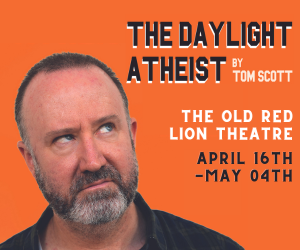On 5th February 1941, during heavy gales, the cargo ship SS Politician ran aground off the Island of Eriskay in the Outer Hebrides. All the crew were rescued by local whisky-starved islanders who, on hearing that the ship’s holdheld 28,000 cases of "the Water of Life", took it upon themselves to salvage as much whisky as possible before British Government officials arrived on the scene.
The assembled cast of five actors is strong, especially Iain Macrae who plays local man Duncan as well as a host of other characters.
Six years later, Scots-born writer Compton MacKenzie published his fictional account of the incident, Whisky Galore; this, in turn, inspired the much-loved 1949 Euston Studiofilm – with added exclamation mark! In the early 1980s , a stage version of the story was performed, essentially, as a 1940s radio drama. By any standard, Whisky Galore has become an iconic tale of how the “little people” can still pull a fast one from under the nose of the most pompous of authorities.
Yet this new adaptationby Iain Finlay Macleod – presented by the National Theatre of Scotland, Robhanis Theatar and Glasgow's A Play, A Pie and A Pint – is significantly different. While MacKenzie made a reasonable job of capturing the various accents of the area, and included many common Gaelic words in use at the time (the novel comes with a useful glossary), he was still essentially writing in English. Macleod's adaptation is the first to be primarily spoken in the islanders’native language, Gaelic.
This immediately raises issues of cultural conflicts, which are underlined by MacLeod’s decision to set the play largely in the present day, in the fictional Outer Hebridean pub the SS Cabinet Minister – the name Mackenzie gave to his sinking ship. Initially bereft of whisky because of stormy weather, the somewhat despondent and bored locals are inspired by the arrival of a young Irish woman, in search of her Hebridean roots, to re-enact aspects of the famous story of the sinking.
We soon realise that this telling of stories is important, not least because MacLeod chooses to critique the right of any outsider – Compton Mackenzie included – to take ownership of the islanders’own narratives, even if they’re more than happy to share them with whoever comes in through the door.
The assembled cast of five actors is strong, especially Iain Macrae who plays local man Duncan as well as a host of other characters. Yet he and the rest are not always well-served by a script which takes too little from Mackenzie’s novel to really make you care about any of its characters and situations, while the echoes of such relationships in the present are too broadly painted to be taken seriously.
Yet, there’s definitely a warmth here; this is a lively, light-hearted production with definitely good intentions. The only shame is that the necessary “under an hour” running time ensures the whole thing feels somewhat rushed; you’ll probably have a better sense of what’s happening within the 1940s narrative if you’ve seen the film.









